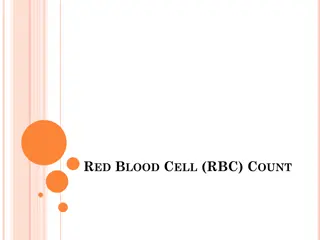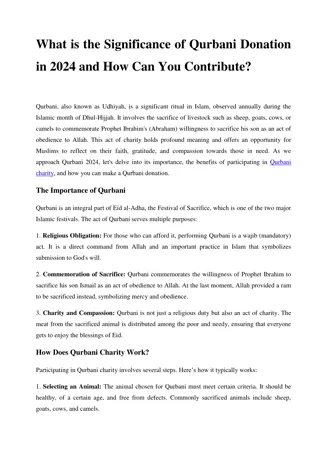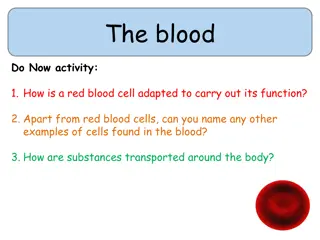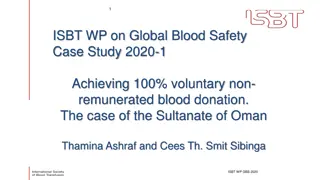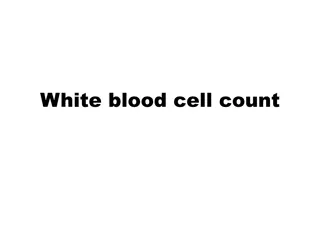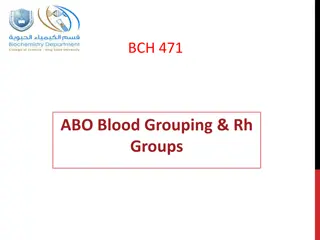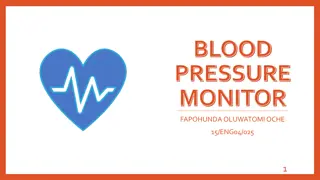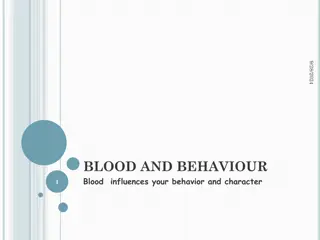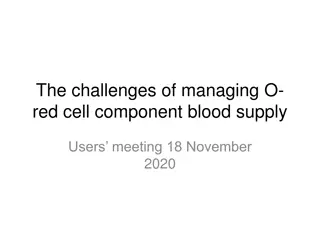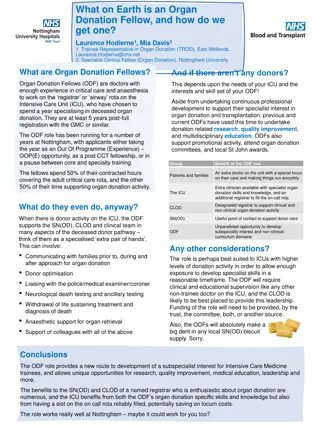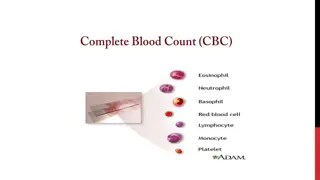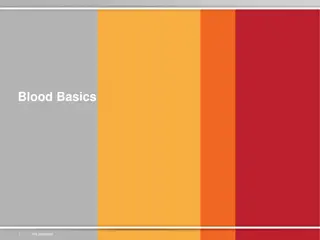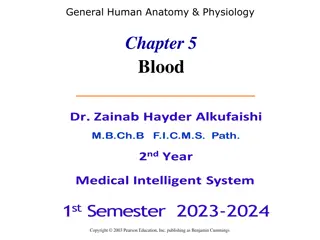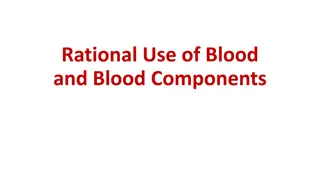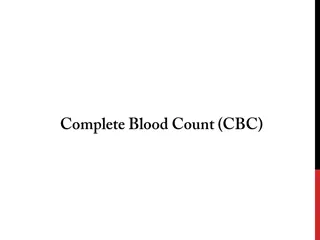Transfusion
Blood transfusion is a crucial medical procedure worldwide, with various components like packed red blood cells, plasma, platelets, and cryoprecipitate being utilized for efficient use. Differential centrifugation is employed for component preparation, ensuring precise separation of red blood cells,
2 views • 45 slides
Differential white blood cell count
Differential white blood cell count, also known as a leukocyte count, is a crucial test to determine the different types of white blood cells present in the blood. The cells are classified into granulocytes (neutrophils, eosinophils, basophils) and agranulocytes (lymphocytes, monocytes). Blood smear
3 views • 21 slides
Understanding Human Blood Groups and Genetics
Human blood groups are determined by the presence or absence of specific antigens and antibodies. The ABO system categorizes blood into four types (A, B, AB, O), while the Rh factor (D antigen) determines whether blood is RhD positive or negative. Blood group antigens are crucial for safe transfusio
2 views • 14 slides
Understanding How Diabetes Affects Blood Vessels
Diabetes can harm blood vessels, leading to complications due to high blood sugar levels. Hemoglobin A1c plays a crucial role in monitoring glucose control, with values above 6.5% indicating diabetes. Over time, high blood sugars can damage blood vessels, affecting blood flow and increasing the risk
1 views • 19 slides
Understanding Organ Donation in Hong Kong
Explore the various aspects of organ donation in Hong Kong, including suitable organs for donation, living and cadaveric donation processes, low donation rates, common misconceptions, and how to register as an organ donor through the Centralised Organ Donation Register. Discover the opt-in and opt-o
3 views • 28 slides
Understanding Red Blood Cell (RBC) Count and Its Significance in Blood Health
Red blood cells, comprising nearly 45% of blood volume, play a crucial role in oxygen transport. The red blood cell count, measured as the number of cells per unit volume of blood, helps assess the adequacy of oxygen-carrying capacity. Normal values vary by age and gender. The experiment aims to det
8 views • 16 slides
Engaging Our Community: Organ Donation Initiatives and Success Stories
Two impactful initiatives in the healthcare sector aimed at promoting organ and tissue donation within communities are highlighted. The first initiative involves hosting luncheons with faith leaders to educate and raise awareness, resulting in increased support for donation. The second initiative sh
0 views • 4 slides
Understanding the Components of Blood for Better Health
Explore the main components of blood such as red blood cells, white blood cells, platelets, and plasma. Learn how these components function, their percentages in blood, and how they impact human health. Discover the importance of blood donation and how changes in blood composition can affect overall
2 views • 19 slides
Understanding Blood Groups and Their Significance
Human blood types are determined by specific antigens and antibodies present on red blood cells, influencing crucial aspects like blood transfusions and familial relationships in forensic medicine. The ABO system, with its four main blood types (A, B, AB, O), plays a vital role in categorizing blood
7 views • 14 slides
What is the Significance of Qurbani Donation in 2024 and How Can You Contribute
This act of charity holds profound meaning and offers an opportunity for Muslims to reflect on their faith, gratitude, and compassion towards those in need. As we approach Qurbani 2024, let's delve into its importance, the benefits of participating in Qurbani charity, and how you can make a Qurbani
2 views • 3 slides
Understanding Blood Cells and Transport Mechanisms
Your blood, consisting of red blood cells, white blood cells, platelets, and plasma, plays a crucial role in transporting substances like oxygen, nutrients, and waste products throughout your body. Red blood cells are specialized for oxygen transport due to their unique adaptations, while white bloo
2 views • 18 slides
Achieving 100% Voluntary Non-Remunerated Blood Donation in Oman
In the Sultanate of Oman, the Department of Blood Services has successfully moved towards 100% Voluntary Non-Remunerated Blood Donation (VNRBD), focusing on motivating the public to donate blood regularly. This shift has led to a significant increase in blood donations from 2007 to 2011, with a grow
1 views • 26 slides
Organ Donation Awareness and Education Activities
Explore the importance of organ donation through engaging activities, such as quizzes on organ and tissue donation facts and myths. Learn about the various organs and tissues that can be donated, the significance of registering on the NHS Organ Donor Register, and the impact of organ donation in sav
1 views • 26 slides
Understanding White Blood Cell Count and Measurement Methods
White blood cell count measures the number of white blood cells in a specific volume of blood, indicating infection or disease progression. The normal range is 5000-11000 cells/cubic mm, varying with age. Methods include manual and electronic counting using specific instruments. Materials like antic
0 views • 14 slides
Autologous Blood Donation: Advantages, Types, and Considerations
Autologous blood donation involves collecting and storing a patient's own blood for later transfusion, offering numerous advantages such as reducing the risk of transfusion-transmitted diseases and providing compatible blood for patients with allo-antibodies. However, it also comes with concerns lik
1 views • 46 slides
Understanding ABO Blood Grouping and Rh Groups
ABO blood grouping and Rh factor testing are crucial for blood transfusions and forensic medicine. The presence or absence of specific antigens and antibodies in human blood determines blood type. Genetic inheritance from parents establishes blood type, with codominance influencing offspring phenoty
0 views • 13 slides
Understanding Blood Components and Their Administration
Effective blood transfusion therapy relies on the availability and proper administration of various blood components. Separating blood components allows for better patient care by matching transfusions to individual needs and avoiding unnecessary components. Different blood products like packed red
1 views • 27 slides
Donation Page Optimization Guide
Learn how to enhance your donation page settings for improved user experience and increased fundraising success. Discover essential customization tips, admin permissions setup, and dedication options to maximize your donation campaign impact.
0 views • 17 slides
Understanding Blood Pressure Monitoring
Blood pressure monitoring is essential for maintaining overall health. This article explores the significance of blood pressure, the importance of monitoring it, and the methods used to measure blood pressure. It also delves into the clinical need for accurate blood pressure monitoring devices and t
0 views • 22 slides
Efficient Management of Donations at Donation Bank
Donation Bank is a non-profit organization that collects gifts from private individuals. Gifts need to be certified for tax deduction purposes and attributed to specific projects. Donors receive acknowledgements and certificates for their contributions. The organization maintains archives for person
0 views • 19 slides
Modernizing Organ Donation Laws: The Uniform Anatomical Gift Act of 2006
The Uniform Anatomical Gift Act (UAGA) of 2006 aims to enhance the donation process by introducing new definitions, emphasizing personal autonomy, and providing clearer rules. It addresses the need for uniformity, updates to reflect current practices, and modernizes the Act to ensure a smoother orga
0 views • 14 slides
Bringing Life Through Organ Donation: Two-Week Action Plan
Over the next two weeks, the Gift of Life aims to refocus on connecting with palliative care teams, educate ICU staff on the importance of early referrals, raise awareness in the Caribbean community about organ donation, coordinate information sessions with OPO liaisons, and encourage colleagues to
0 views • 64 slides
Proposed Ordinance for Donation Box Regulations in Houston
Vice Mayor Pro Tem Castex-Tatum received complaints about unauthorized donation boxes in District K, leading to a survey identifying issues like clutter and safety hazards. As a result, regulations are being developed for all donation boxes in the city, including requirements for operator contact in
0 views • 12 slides
Organ Donation and Transplantation Myths True or False
Explore common myths and facts about organ donation and transplantation through a fun true or false game. Learn the truth behind misconceptions like who can be a donor, the possibility of brain transplants, where to register as a donor, fairness in organ allocation, and the impact on funeral arrange
1 views • 14 slides
Versiti Blood Center of Illinois: Community Impact through Blood Drives
Versiti Blood Center of Illinois, a nonprofit organization, plays a vital role in healthcare by organizing blood drives to ensure a sufficient supply of blood for hospitals in the Chicagoland and Northwest Indiana area. Through employee engagement, community outreach, and raising awareness about the
0 views • 10 slides
Managing Genetic Haemochromatosis Through Blood Donation: Opportunities and Challenges in Aberystwyth
Genetic Haemochromatosis (GH) patient shares journey from diagnosis to becoming a blood donor for treatment. Limited donation sessions in Aberystwyth pose challenges for induction and maintenance phases. Request for additional sessions in summer to support GH patients.
0 views • 5 slides
Organ, Eye, and Tissue Donation: Facts and Education for the Classroom
Explore essential information on organ, eye, and tissue donation, including common questions, the impact of donation, and how to register as a donor. Learn about the waiting list for transplants, the significance of eye donation, and the process of becoming a donor to save lives. This fact sheet pre
0 views • 11 slides
Blood Types and Personality Traits - Insights into Behavior and Character
Blood types O, A, and B are associated with specific personality traits and behaviors. Those with blood type O are characterized by confidence, honesty, and optimism. Blood type A individuals tend to be perfectionists, sensitive, and pessimistic. Blood type B individuals are creative, expressive, an
0 views • 10 slides
Challenges in Managing O- Red Cell Component Blood Supply
Addressing the challenges of managing O- red cell component blood supply involves considerations such as compatibility rules, absolute and relative indications, EBA benchmark comparisons, data monitoring, case studies, D variant specifications, and recommendations for transfusions. The supply side c
0 views • 39 slides
Understanding the Role of Organ Donation Fellows in Intensive Care Units
Organ Donation Fellows (ODFs) are experienced doctors specializing in deceased organ donation, spending time on the ICU rota and supporting organ donation activities. They assist in donor optimization, communication with families, and organ retrieval, benefiting both ICU patients and the healthcare
0 views • 4 slides
Understanding Complete Blood Count (CBC) Test
Complete Blood Count (CBC) is a panel of tests that evaluates different types of blood cells, including red blood cells, white blood cells, and platelets. CBC helps diagnose various blood disorders and monitor conditions that affect blood cells, such as anemia or infections. The test is ordered base
0 views • 20 slides
Understanding the Basics of Blood and Transfusions
Blood is a vital tissue that performs essential functions like delivering oxygen and nutrients, maintaining immunity, and controlling body temperature. Blood transfusions save lives by treating accident victims, transplant recipients, cancer patients, and those with blood-related diseases. Component
0 views • 20 slides
Blood Transfusion in Surgery: Types and Indications
Blood transfusion plays a crucial role in surgery, with different blood products such as whole blood, packed red cells, fresh-frozen plasma, cryoprecipitate, and platelets being used based on specific needs. Understanding the indications and proper handling of blood products is essential for safe tr
0 views • 13 slides
Overview of Blood and Hematology: Functions and Composition
The human body consists mostly of water, with blood making up approximately 8% of body weight. Blood is composed of plasma and formed elements, including red blood cells (erythrocytes), white blood cells (leukocytes), and platelets. Plasma, the liquid part of blood, contains various proteins such as
0 views • 12 slides
Understanding Blood: Composition and Functions
Blood is a vital fluid tissue in the human body, classified as a connective tissue. It consists of living cells known as formed elements suspended in a non-living matrix called plasma. The physical characteristics of blood, such as color range, pH level, and temperature, play crucial roles in mainta
0 views • 33 slides
Comprehensive Guide to Blood Collection Techniques in Medical Investigations
Blood collection is a crucial process in medical investigations where blood is withdrawn from patients for analysis. Methods include arterial sampling, venipuncture, and fingerstick sampling, each serving specific purposes. Venous blood is preferred over arterial blood due to accessibility and ease
0 views • 10 slides
Rational Use of Blood and Blood Components in Healthcare
Rational use of blood and blood components is crucial in healthcare settings to maximize resources, minimize risks, and enhance patient outcomes. This involves avoiding unnecessary transfusions, understanding the risks associated with transfusions, dispelling misconceptions, and choosing the most ap
0 views • 32 slides
Importance of Verification for Patient Identification & Blood Product Labeling in Medical Procedures
This educational program emphasizes the crucial role of verifying patient identification and blood product labeling in medical settings. It covers the significance of accurate verification, policy expectations, and the process for ensuring patient safety during blood product administration. The prog
1 views • 30 slides
Understanding Blood Group and Cross Matching in Transfusion Medicine
Blood group and cross matching play crucial roles in determining blood compatibility for transfusion. The presence or absence of specific antigens on red blood cells, along with antibody reactions, help identify blood types and ensure safe transfusions. Cross matching involves testing donor and reci
0 views • 8 slides
Understanding Complete Blood Count (CBC) Testing
Complete Blood Count (CBC) is a crucial test that provides information about the composition of a patient's blood, including red blood cells, white blood cells, and platelets. This test helps in diagnosing conditions such as anemia, infections, and more. CBC involves analyzing parameters like RBC co
0 views • 20 slides





